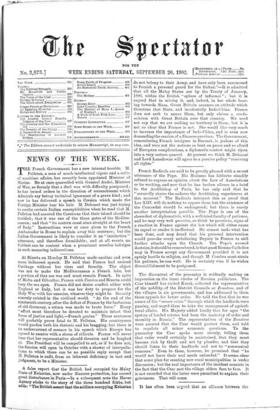The discontent of the peasantry is evidently making an impression
on the inner circles of Russian politicians. The Czar himself has visited Kursk, collected the representatives of the nobility, of the District Councils or Zcrnstvos, and of the villages in six governments, and has addressed to them three appeals for better order. He told the first that he was aware of the "severe crisis" through which the landlords were passing, and urged them to take the management of agricul- tural affairs. His Majesty added kindly that for ages "the system of landed estates had been the mainstay of order and morality in Russia." The representatives of the Zemstvos were assured that the Czar would protect them, and told to regulate all minor economic questions. To the peasantry the Czar spoke more sternly, telling them that order would certainly be maintained, that they must become rich by thrift and not by plunder, and that they should listen to their landlords and not to "nonsensical rumours." Even to them, however, he promised that " he would not leave their real needs unheeded." It seems clear that some plan for creating new rural municipalities is under discussion; but the real importance of the incident consists in the fact that the Czar met the village elders face to face. It is not recorded that the latter were permitted to explain their grievances. That will come.






































